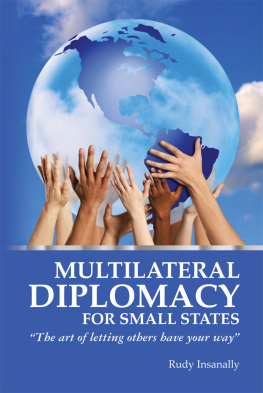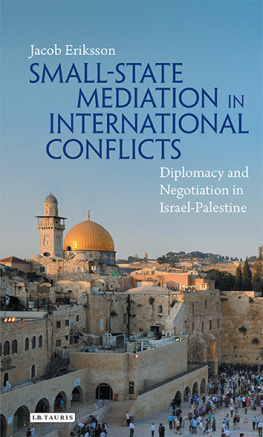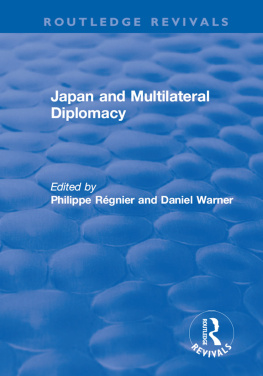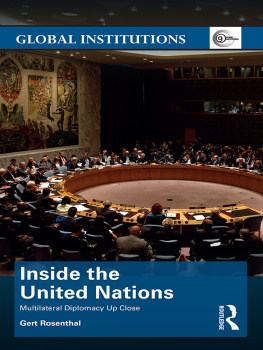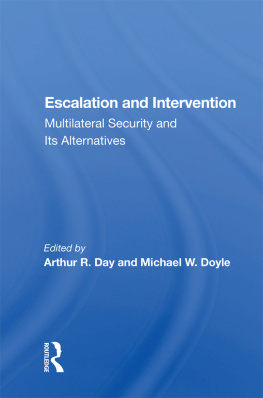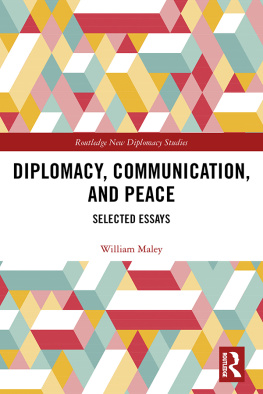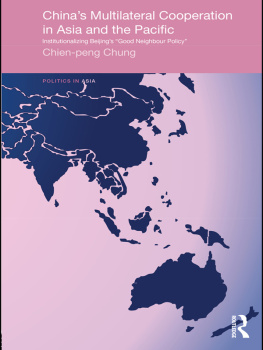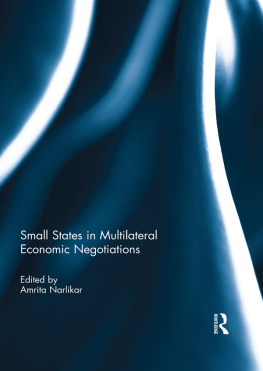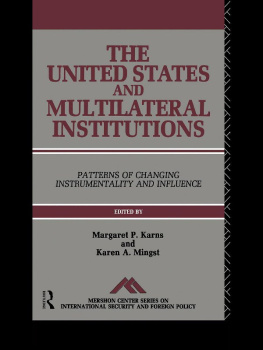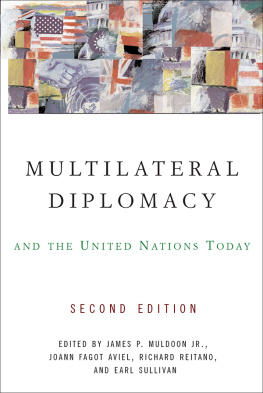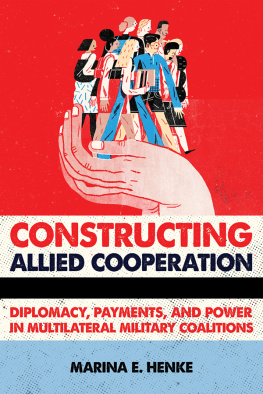Rudy Insanally - Multilateral Diplomacy for Small States: The art of letting others have your way
Here you can read online Rudy Insanally - Multilateral Diplomacy for Small States: The art of letting others have your way full text of the book (entire story) in english for free. Download pdf and epub, get meaning, cover and reviews about this ebook. year: 2014, genre: Politics. Description of the work, (preface) as well as reviews are available. Best literature library LitArk.com created for fans of good reading and offers a wide selection of genres:
Romance novel
Science fiction
Adventure
Detective
Science
History
Home and family
Prose
Art
Politics
Computer
Non-fiction
Religion
Business
Children
Humor
Choose a favorite category and find really read worthwhile books. Enjoy immersion in the world of imagination, feel the emotions of the characters or learn something new for yourself, make an fascinating discovery.
- Book:Multilateral Diplomacy for Small States: The art of letting others have your way
- Author:
- Genre:
- Year:2014
- Rating:5 / 5
- Favourites:Add to favourites
- Your mark:
- 100
- 1
- 2
- 3
- 4
- 5
Multilateral Diplomacy for Small States: The art of letting others have your way: summary, description and annotation
We offer to read an annotation, description, summary or preface (depends on what the author of the book "Multilateral Diplomacy for Small States: The art of letting others have your way" wrote himself). If you haven't found the necessary information about the book — write in the comments, we will try to find it.
Rudy Insanally: author's other books
Who wrote Multilateral Diplomacy for Small States: The art of letting others have your way? Find out the surname, the name of the author of the book and a list of all author's works by series.
Multilateral Diplomacy for Small States: The art of letting others have your way — read online for free the complete book (whole text) full work
Below is the text of the book, divided by pages. System saving the place of the last page read, allows you to conveniently read the book "Multilateral Diplomacy for Small States: The art of letting others have your way" online for free, without having to search again every time where you left off. Put a bookmark, and you can go to the page where you finished reading at any time.
Font size:
Interval:
Bookmark:

Multilateral Diplomacy for Small States
The art of letting others have your way
A book by Rudy Insanally
Design & layout by
Guyenterprise Advertising Agency
234 Lance Gibbs & Irving Streets,
Queenstown, Georgetown,
Guyana South America
ISBN# 978-976-9549-20-3
Copyright S. R. Insanally 2013
No part of this book may be reproduced except
by written permission from the author.
DEDICATION
To the Government and People of Guyana without whose trust and confidence I would not have served.
To my wife Bonita, daughter Amanda and sister Annette without whose encouragement and assistance this book would not have seen the light of day.
To my brothers Ray and Vic, who supported my efforts.
And especially to my deceased parents Mohamed and Doris, and brothers Ronald, Harry and Mikey who, though gone, are never forgotten.
ACKNOWLEDGEMENTS
I wish to acknowledge with appreciation and sincere thanks:
- The late Dr. Cheddi Jagan and Mrs. Janet Jagan O.E, former Presidents of Guyana who encouraged me to write up our countrys Presidency of the 48th U N General Assembly.
- The Director General and Staff of the Ministry of Foreign Affairs, particularly those at the Permanent Mission of Guyana to the UN, New York on whose cooperation I have often relied in the past.
- The members of my Cabinet during our Presidency, especially its Head, Dr. Bertram Collins (now deceased), Mr. Neil Pierre, Ms. Allison Drayton, Ms Cynthia Henry (spokesperson), Mr. Dennis Grimm, my security officer and other UN Secretariat Staff.
- Professor Denis Benn (UWI - Mona), and the late Professor Ralph Carnegie (UWI Cave Hill), Dr. Anthony Gonzales (UWI - St. Augustine) and Dr. Clive Thomas of the University of Guyana for advice and assistance in their respective areas of specialization.
- My Confidential Secretaries from 1987 onward - Mrs. Lorraine Gibson, (Permanent Mission, New York), Mrs. Verna Mc Callum, and Mrs. Carol Barker (Ministry of Foreign Affairs Guyana) for their devotion and hard work.
Last but certainly not least:
My wife Bonita for diligently helping to type the manuscript, my sister Annette (Director of the Latin American and Caribbean Centre U W I, Jamaica) and my brother Vic (Managing Director of Guyenterprise Ltd, Guyana) who all contributed their time and talent to the books publication.
NOTES
- I wish to issue the usual caveat that the views expressed in the book are my own and not necessarily those of the Government of Guyana or any other.
- In Appendix I, I have included two statements on the subject of training of diplomats which may be of interest to some readers.
- Wherever the pronoun he is used in the text, the reader should understand it to include she, except of course, where I am referring to a specific person.
CONTENTS
FOREWORD
It is important that those who have been charged with the responsibility of representing and negotiating for their countries, and whose capacity and influence have been demonstrated in these domains, leave behind on their retirement from office, a legacy of experience and advice for those who follow in their footsteps.
This book which is the fruit of the authors long and successful diplomatic career, in service not only to his own country but also to the wider international community, teaches that success in the conduct of international affairs requires great vision, tact and versatility. Diplomats of the new generation can learn much from his experiences and observations in the field of multilateral diplomacy.
In modest but sophisticated language, the writer describes the challenging yet satisfying work of diplomats on the international stage. The tone of the narrative is never political or academic. Sometimes anecdotal, always engaging, the book reveals the inner workings of multilateral diplomacy as it seeks to build international agreement and cooperation. Readers are made aware of the many issues of the multilateral agenda not from text-book theses but rather from a sense of participation in the various debates.
Written from a small state perspective, the book is a valuable addition to the limited literature published on the art and practice of multilateral diplomacy and will undoubtedly command the attention of governments and foreign services everywhere. It is a reminder that though our nations are small and constrained by human and financial resources, they do have a meaningful contribution to make on matters that concern their welfare.
Despite its main focus, however, the work will undoubtedly enjoy a much wider readership, to include all those who are interested in world events and the impact which these can have on their lives. As we know, the number of actors in modern diplomacy now goes beyond governments and their foreign services to include representatives of the private sector, the labour movement, non-governmental organizations and civil society as a whole. Such persons are also likely to find these essays to be informative and instructive.
The author does not conceal his disappointment that world leadership, especially that in the developed countries, seems either unwilling or unable to adequately address the fundamental problems of global peace and development. However, he refuses to yield to pessimism and urges us to see our challenges as opportunities to do better. His contention is that even in the midst of adversity, we have opportunities to strive for our salvation. We need only bestir ourselves and work for the common good.
The world and its peoples will surely find comfort in these words of hope as they continue to face the myriad of problems which threatens human existence. Above all, they will realize that multilateral diplomacy remains a necessary instrument for the promotion of international peace and prosperity.
Annette Insanally
INTRODUCTION
It was ... a Foreign Office joke that I could never make a speech of any length without using the word mankind; it seems to me a good word for a Foreign Secretary to have firmly fixed in his head.
Michael Stewart
Former British Foreign Secretary
in Life and Labour (1980)
It was with some trepidation that I started putting this book together. Mindful of Ecclesiastes teaching that Of the making of books there is no end, and much study wearies the body (chapter 12, verse 12), I was not inclined to add to the rich stock of literature already in print. I was finally persuaded by some of my friends in academia that it may be of use to those interested in diplomacy, especially the new generation of Foreign Service Officers in developing countries, for me to distill from my own long experience in the field, some views on the art and practice of multilateral diplomacy. Accordingly, I have compiled some of my statements at the United Nations, where I served for almost fourteen years, and those made in several other fora while I was Foreign Minister of Guyana. Excerpts from these statements which address and illustrate several contemporary topics in international affairs have been selected and updated with an eye to their continued relevance. This Introduction is intended to provide a context in which the presentations are made.
Presidency of the UN General Assembly
In September of 1993, I was elected President of the 48th Session of the United Nations General Assembly. It was the first time that a national of the Caribbean Community had been elected by the membership to hold that high office. Years earlier, Barbados had promoted the candidacy of Dame Nita Barrow, sister of the former Barbadian Prime Minister, Errol Barrow and herself an eminent personality, for the Presidency of the General Assembly. Despite a strong campaign waged by Caricom on her behalf, she lost unexpectedly to the dark horse Argentine candidate, Dante Caputo, a former Foreign Minister for his country. Later, at the 46th Assembly, the Ambassador of Yemen, who had been at the UN for some seventeen years and was highly regarded by colleagues, saw his aspiration to the Presidency defeated as a consequence of the Gulf War and his candidature suddenly replaced by that of the Saudi Arabian Ambassador. I was understandably relieved and pleased by my own unanimous election at the 48th Session.
Next pageFont size:
Interval:
Bookmark:
Similar books «Multilateral Diplomacy for Small States: The art of letting others have your way»
Look at similar books to Multilateral Diplomacy for Small States: The art of letting others have your way. We have selected literature similar in name and meaning in the hope of providing readers with more options to find new, interesting, not yet read works.
Discussion, reviews of the book Multilateral Diplomacy for Small States: The art of letting others have your way and just readers' own opinions. Leave your comments, write what you think about the work, its meaning or the main characters. Specify what exactly you liked and what you didn't like, and why you think so.

